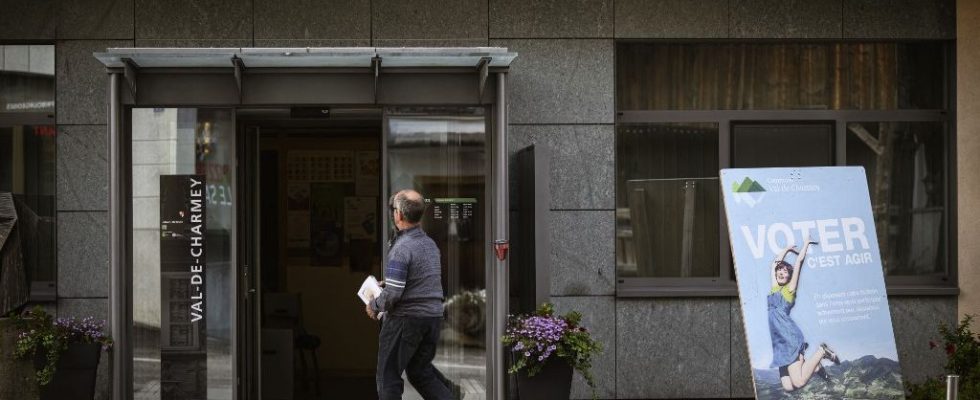The Swiss are voting this Sunday (the vast majority by mail), in a context of the European migration crisis and rising fears linked to the risk of attacks in Europe. According to polls, the Swiss populist right, anti-immigration and anti-EU, should win these legislative elections.
The small Alpine country, which has some 8.8 million inhabitants, renews its 200 deputies of the National Council (lower house) by proportional vote, and its 46 senators of the Council of States (upper house) by majority vote. The composition of the upper house – under the control of the liberal right and the center – hardly varies over the elections. In the lower house, the hard-right party UDC (Democratic Union of the Center) should, according to polls, consolidate its place as the leading political force to the detriment of the liberal-radicals (PLR), while the Greens should cede ground to the socialists (PS).
Beyond its chocolate, its cheeses and its banks, here are five things to know about Switzerland, while a first projection of the results in percentages is expected at 4 p.m.
A quarter of foreigners
Switzerland is one of the countries with the highest proportion of foreigners (25%) on its territory. At the end of 2022, Italians still formed the largest foreign population with 335,755 permanent residents. They were followed by the Germans (317,544 people), the Portuguese (257,829 people) and the French (157,769 people). Due to the sharp increase in demand on the labor market, net immigration in the foreign population permanently residing in the country increased again last year by 14.8% compared to 2021. The very large The majority of these people came from the European Union or EFTA (Iceland, Liechtenstein and Norway).
Neutrality above all
Since 1815, Switzerland has been officially recognized as a neutral country by the international community. Under the law of neutrality, Switzerland cannot participate in a war between other states. It must also not favor belligerent parties on a military level, whether in the form of troops, armaments or the provision of its own territory. A position which drew criticism from Switzerland after the invasion of Ukraine.
The law of neutrality does not, however, prevent it from supporting a military operation decided by the UN Security Council, nor from adopting international sanctions. Switzerland has adopted the same economic sanctions against Moscow as the EU. This neutrality of Switzerland is “freely chosen, permanent and armed”. The country therefore has a militia army, the men being obliged to perform their military service and subsequently to carry out, for several years, “rehearsal courses” which last several weeks per year.
The art of compromise
A direct democracy, Switzerland is governed by seven ministers elected by parliament according to a consensus which currently allows five parties to be represented in the government, the Federal Council. This Sunday, the Swiss must renew, like every four years, the Federal Assembly, the bicameral parliament. Note that the new Federal Assembly will appoint the Federal Council on December 13.
The Confederation, the cantons and the municipalities (26 cantons and more than 2,000 municipalities) operate – at the level of the executive power – according to the principles of collegiality and consensus. At the federal level, all decisions come from the Federal Council as a whole and involve its seven members, who represent the main parties. Thus, it is not unusual to see a minister from the right defend a bill from the left, and vice versa. In turn, one of the ministers assumes the role of President of the Confederation for one year.
This without forgetting that the Swiss not only have the right to vote, normal in a democracy, but also the right to vote on concrete questions, at the local, cantonal and federal level. Direct democracy allows the Swiss to express their opinion on the decisions of Parliament or to propose constitutional modifications. Popular votes – in the form of initiatives or referendums – are thus organized every three months.
The cultural barrier or the “Röstigraben”
More than 60% of the Swiss population uses German. French, Italian and Romansh – a Rhaeto-Romance language with Latin roots – are the three other official languages. The literal French translation of “Röstigraben” is “rösti ditch” – rösti being potato pancakes, typical of German-speaking Switzerland – but the Swiss prefer to speak of “rösti barrier” or “rösti curtain”.
This term does not designate a culinary dispute, but a cultural barrier between the French-speaking French-speaking region and the German-speaking Alemannic region. These cultural differences and mentalities are particularly evident during federal votes, with French-speaking people having the reputation of being more open, particularly on the European question, immigration or the role of the State.
Small country, big business
Switzerland is a small country nestled in the heart of Europe, but it is not part of the European Union. However, it is part of the European Schengen free movement area. Switzerland’s GDP per capita is one of the highest in the world, with the country regularly coming in 3rd or 4th place in the world rankings. Very diversified, its economy is based on a powerful pharmaceutical industry but also on the manufacturing of machines and luxury watches as well as an important banking and insurance sector.
Strongly focused on exports, it benefits greatly from globalization. It is home to many large companies such as Nestlé, Roche, Novartis, ABB and Swiss Re and has one of the highest densities of multinational headquarters in the world, thanks to its advantageous taxation. Many commodity trading companies have established themselves there, such as Glencore. Google has also set up its European engineering center there.

